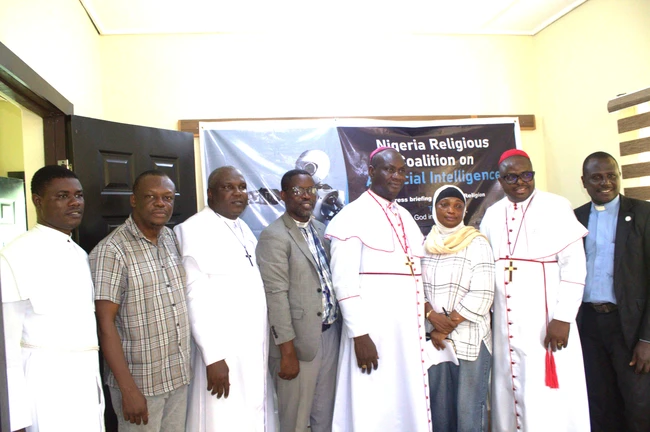An Address by Rt. Rev. E. Oluyinka Akande, Bishop, Diocese of Lagos West, Methodist Church Nigeria at a press briefing by the Nigeria Religious Coalition on Artificial intelligence (Christian Council of Nigeria, Institute of Church and Society Ibadan (CCN-ICS ) and Jama’atu Nasril Islam (JNI) with the support of the Future of Life Institute (FLI)
I am pleased to be here today to address important issues of technological development that border on humanity and the existence of man. Let me first extend my sincere gratitude to our co-organizer, Jama’atu Nasril Islam (JNI)) and the Future of Life Institute (FLI) for the support.
It is a fact that Artificial Intelligence (AI) has the power to make the world move fast and proffer solutions to specific issues in today’s society. Also, it is no longer news that AI has come to stay in today’s world. But we will be lying to ourselves if we think that technological development does not have effect on humanity or have the tendency to make men think and act like they are god, even when such acts affect their fellow humans.
Consequently, it is important for religious communities to have conversations on the need to create a balance between the technological world and the religious world so that what is meant to give relief will not create a more deadly problem for humanity.
This is a conversation that religious communities cannot shy away from and this is the crux of today’s gathering. I thank you for coming and I will be happy to answer your questions after this.
Relationship between humanity and Artificial Intelligence (AI)
The US and China are seeing rapid breakthroughs at the frontier of what artificial intelligence is capable of, in the corporate race to create Artificial General Intelligence (AGI), which will be able to do every human task better than us. AI researchers do not know how to control the systems they are producing. AI systems act increasingly deceptively and unpredictably. Yet such systems are being put in charge of companies, military applications and important decision-making with real-world impacts. There is no plan for how to prevent the sudden disasters or gradual disempowerment risked by these developments.
A.I. is pervasive:
- Embedded in personal assistants helping us manage our routines and answering our questions.
- It is powering the code that translates social media posts into natural languages so anyone, regardless of their language preference, can understand and share them.
- It’s part of the algorithm that allows e-commerce platforms to suggest products and discounts.
- It manages our health care and fitness
- It navigates our spacecraft, ocean vessels, trains, buses, trucks and cars.
As technologists, politicians, scientists and business people push the limits of A.I., religious groups, philosophers and academics also debate how far A.I. should go — and what should happen as it becomes part of the fabric of our lives. As a result, it raises several spiritual and moral questions about identity, the self, and what it means to be human. These questions impact the way we approach work, family and our faith. It can result in fear of “strong A.I.,” or what A.I. could someday become: human intelligence replicated inside machines.
Strong A.I. is also known as Artificial General Intelligence (AGI). So far, not yet achieved, but upon its arrival, will require a total rethinking of the qualities we associate with the human experience: consciousness, purpose, intelligence, the soul — in short, personhood. When a machine possesses the ability to think like a human or make its decisions autonomously, should that machine be considered a person?
Religious communities may have the most significant stake in the conversation about AGI and personhood. One of the worst possible outcomes for A.I. is that of polarizing two worlds: the technological world and the religious world. There has been a significant lack of meaningful discourse between the two communities. This lack of dialogue has been discouraging and prevents religion from contributing a necessary perspective to technological development. If we do not include belief in the development of new technologies, we miss the opportunity to augment human life and benefit religion. If we somehow diminished personhood by creating artificial intelligence, that’s a bad thing. But, if we can create artificial intelligence that allows people to live life more fully, it could bring people closer to God.
For popular religions in particular, the debate regarding personhood originates with the theological term Imago Dei, Latin for “image of God.” This term implies the relationship between humans’ and their divine creator. In the bible, the book of Genesis reads, “God created mankind in his image.” As theology goes, being created in the divine image affords an individual kind uniqueness to human beings.
If machines imbued with human-like qualities, or personhood, were created, then logic bears that those machines would also be in the image of God. As goes Imago Dei, this would then challenge the claim that humans are the only beings on Earth with a God-given purpose.
This technological development could also infringe on acts of creation that, according to many religious traditions, should only belong to a god. We are not God. However, we have, potentially, inherently within us, a vocation to create via technology. Human creation, however, is necessarily limited. The vital difference is between a higher power creating out of nothing, and humans creating with what’s available on Earth.
Another concern is creating a machine with strong A.I. that becomes an outlet for worship. It would be idolatrous to utilize strong A.I. as a method to defeat death and redefine the human race. These are challenging, and explosive ideas scientists and futurists don’t like to embrace.
Christian and Islamic doctrines tell us that placing one’s trust in anything other than God, the creator is idolatry. That moves way beyond the realm of mirroring God’s creativity. Fundamentally, a stand-in for God will be created in our image if we find in A.I. that with whom we can share our being and our responsibilities.
How will we respond? Conscripting machines to do our bidding, transferring knowledge to them, with their exponential capacity for storage and processing, could result in the devices becoming far more intelligent than humans. Then, one day, the machines may decide to dominate us.
Religions should involve themselves in the application of the A.I. that exists today. For example, Facebook’s content recommendation algorithms are a form of weak A.I. The A.I. is used to help make posts go viral. When some highly emotional, heartbreaking story starts trending, it directly influences the movement and volume of both prayers and charitable activity. These attention algorithms are a clear example of how prayer and charity are being shaped and having a direct impact on the theological priorities of a community.
The connections between religious thinkers and A.I. developers should be made more robust. We make these systems — not the machines. When this becomes the work of computers, how are we going to teach methods for what is right and what is wrong? We have a humanitarian obligation to impact the morality of machines in advance of the development of strong artificial intelligence. Intervening now can prevent the cataclysmic robot-dictatorships that abound in science fiction video games, movies and books. Inherent in A.I. is the capacity to build on itself, embedding ethical principles into the code today is the critical pathway to evolving moral machines tomorrow.
Right now, communities should prepare for the eventual creation of a machine with strong A.I. by thinking about how the technology reflects their values. How can we employ technology to advance the principles of God? By imbuing technology with values that stem from emulating God.
A.I. will change rapidly, but religious and scientific communities have tools to explore both the ethical and moral limits. Key to this is working on ourselves, to shape the technology we have right now.
Need for religious wisdom
The most powerful AI systems are being made without regard for the deeper religious questions at play. Greed for power and wealth are at the centre of these endeavours, not God. 84% of the world believes in traditional religion; they are not represented in the AI race. AI companies aim to change what it means to be human and create their own false gods. Meanwhile, AI’s impacts on democracy, jobs and human relationships will be profoundly disruptive for society, and without religious leadership guiding communities through these changes, we risk widespread, unprecedented chaos.
Nigeria’s religious context
The central importance of Islam and Christianity in all aspects of Nigerian life places Nigerian religious leaders in a position of immense responsibility. But they are well-equipped to answer the needs of their communities, given their rich philosophical, ethical and charitable traditions.
Need for concrete policies
Nigeria, as a regional leader, should push for the establishment of international governance frameworks to safeguard against the global risks of world-leading AI developments. (The Future of Life Institute (FLI) here recommends: hard limits on computational power, enhanced liability frameworks, and comprehensive safety standards.)
Nigerian governance
Nigeria is in a strong position to harness the numerous benefits offered by controllable AI tools: in agriculture, education, healthcare and more. Domestic governance must ensure AI is built and used safely and ethically, in line with Nigeria’s religious values, traditions and communities that people are protected from AI manipulation and that workers’ rights and livelihoods should be respected and prioritised.
Our demand
Given this context, this Nigerian Religious Coalition calls for greater religious engagement on questions around AI, and above all supports the following:
- We should harness AI tools for progress in agriculture, health and education.
- We should prohibit uncontrollable Artificial General Intelligence that will disempower human workers, undermine human relationships or decrease human agency.
- We should guard against AI becoming an idol or leading believers astray through manipulation.
- Specifically on religious applications: religious groups should be proactive to learn about but cautious to apply AI systems. AI, rashly employed, could dehumanise religious practices or be subverted by malicious actors into misleading congregations contrary to their doctrine. Yet careful discernment may yield useful practical applications, such as in speeding up administrative tasks.
![]()









